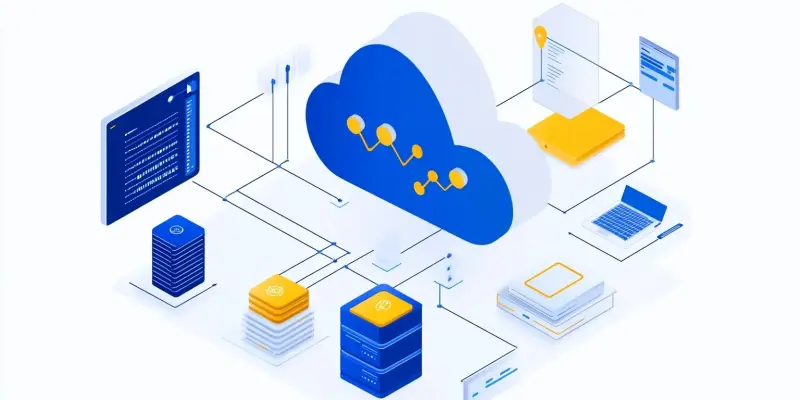In the rapidly advancing technological landscape, the integration of cloud computing and artificial intelligence is revolutionizing data engineering in unanticipated ways. Over recent years, the introduction of high-performance platforms like Amazon Redshift, Snowflake Inc., and BigQuery has fundamentally transformed the industry. Yet, an urgent challenge remained: the efficient transformation of data in the cloud. Addressing this gap, dbt Labs Inc. introduced a cross-cloud SQL-based transformation layer. This innovation is crafting a new narrative in the realm of data engineering, seamlessly amalgamating software engineering principles, continuous integration, continuous delivery, and version control systems into the data workflow.
Tristan Handy, CEO of dbt Labs, underlines the significance of these developments, explaining that they go beyond mere incremental enhancements. Rather, they mark a fundamental shift towards making core innovations practical and beneficial for users. Presenting his thoughts at the Tech Innovation CUBEd Awards series hosted by theCUBE, Handy emphasized that the transformative potential of these advancements lies in their ability to reshape the future of data engineering. These platforms not only bridge the efficiency gaps but also set the stage for broader integration with AI technologies, painting a promising picture for the future of data-driven decision-making.
Integration of AI and Data Structuring
A critical aspect driving the evolution of data platforms is their ability to support the structured data necessary for the effective deployment of generative AI. As businesses increasingly rely on AI for operational efficiencies, the importance of well-structured and governed data cannot be underestimated. Handy articulates that organizations struggling with data structuring and governance will inevitably face hurdles in leveraging AI to its full potential. This acknowledgment has spurred dbt Labs to refine its data engineering practices continually, ensuring compatibility with advanced AI systems and fostering a seamless data integration process.
Generative AI’s dependence on structured data propels the need for innovative data platforms capable of handling complex data workflows. Additionally, dbt Labs’ commitment to openness through continued contributions to open-source projects and community-driven development further accelerates the pace of innovation within this space. The company’s cultural ethos extends its influence beyond proprietary systems, ensuring widespread accessibility and fostering collaboration. Recognized with the “HyperCUBEd Innovation Award – Private Company,” dbt Labs’ approach exemplifies the impactful role open standards can play in the broader industry landscape.
Open Standards and Lasting Innovations
Handy highlights the critical role open standards such as Iceberg and OpenTable play in shaping future strategies for chief data officers. These standards facilitate enhanced data management, adoption of best practices, and seamless interoperability across various platforms. Unlike proprietary solutions, open-source software and knowledge sharing ensure that valuable insights and innovations persist beyond the tenure of any single company. This open philosophy has positioned dbt Labs at the forefront of data engineering advancements, enabling a lasting influence that transcends individual organizational boundaries.
The adoption of open standards drives a collaborative environment where discoveries and improvements are shared, promoting overall industry advancement. By championing this culture of openness, dbt Labs underscores its commitment to the continuous evolution of data engineering. As more organizations recognize the value of open standards, industry-wide adoption could lead to more integrated and cohesive data ecosystems, benefiting from collective insights and shared advancements.
Future Directions in Data Engineering
As the industry continues to navigate the complexities of data migration to cloud systems and the integration of AI, Handy anticipates that the next significant era in data engineering will be shaped by these developments. The migration to cloud infrastructure represents only the beginning; the true potential will be realized through the seamless integration of AI-driven data analytics and the adoption of open standards. Handy’s optimistic outlook suggests that these elements will collectively drive efficiency, innovation, and agility within the data engineering landscape.
John Furrier, co-founder of SiliconANGLE, conveyed his appreciation for the community’s support in advancing these industry discussions. By engaging with platforms like theCUBE, industry leaders underscore the importance of shared knowledge and cooperative growth. This collaborative spirit is essential for maintaining the momentum of innovation and ensuring that high-quality discussions and content continue to support the community’s needs. As organizations embrace these evolving trends, the future of data engineering promises to be interconnected, innovative, and driven by both technological advancements and collaborative efforts.
Summary and Future Considerations
In the fast-moving world of technology, the combination of cloud computing and artificial intelligence is dramatically changing data engineering. Platforms such as Amazon Redshift, Snowflake Inc., and BigQuery have significantly altered the industry landscape in recent years. However, there was a pressing need for more efficient data transformation in the cloud. To address this, dbt Labs Inc. introduced a cross-cloud SQL-based transformation layer. This breakthrough is redefining data engineering by integrating software engineering principles, continuous integration, continuous delivery, and version control systems into data workflows.
Tristan Handy, CEO of dbt Labs, highlights the importance of these advances, suggesting they are not just minor improvements but represent a fundamental shift. Speaking at the Tech Innovation CUBEd Awards hosted by theCUBE, Handy emphasized that these advancements have the potential to revolutionize data engineering by making core innovations more practical and beneficial for users. These platforms close efficiency gaps and pave the way for greater integration with AI, promising a bright future for data-driven decision-making.

